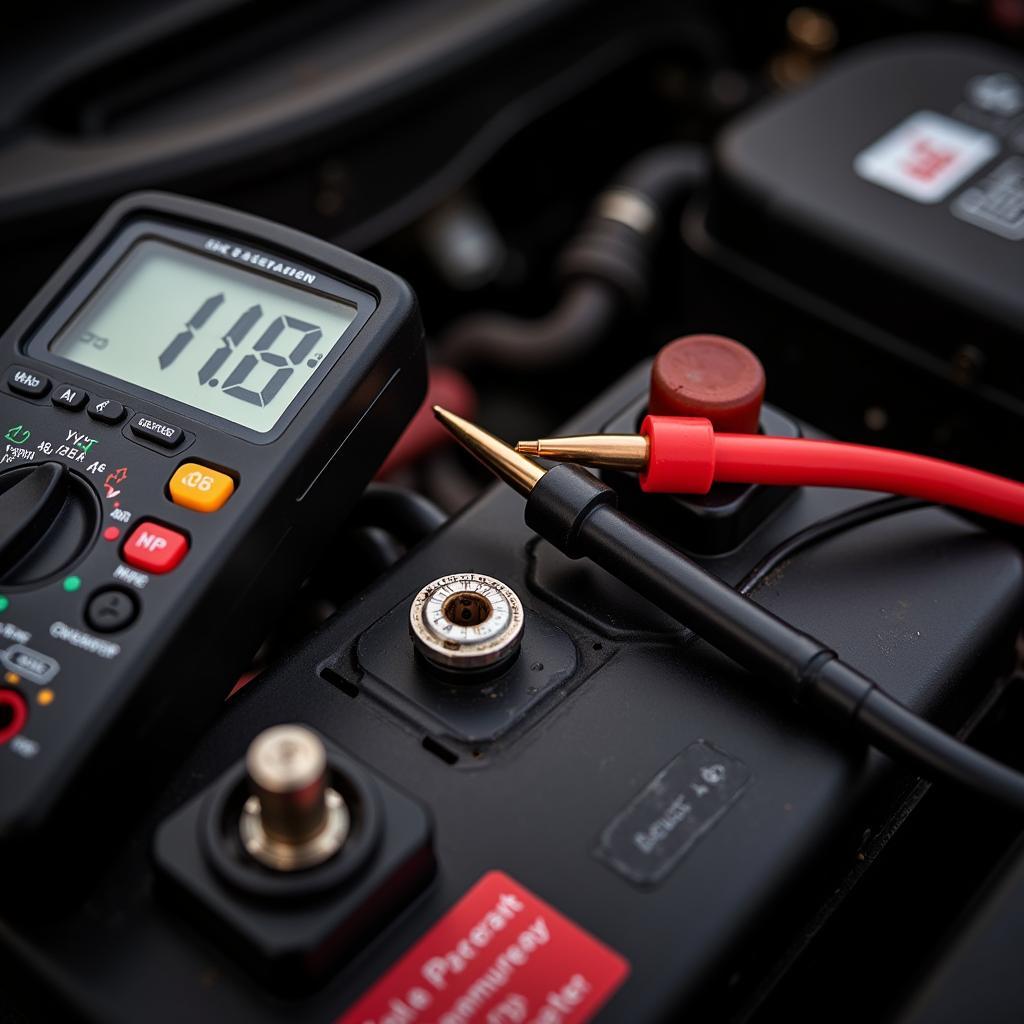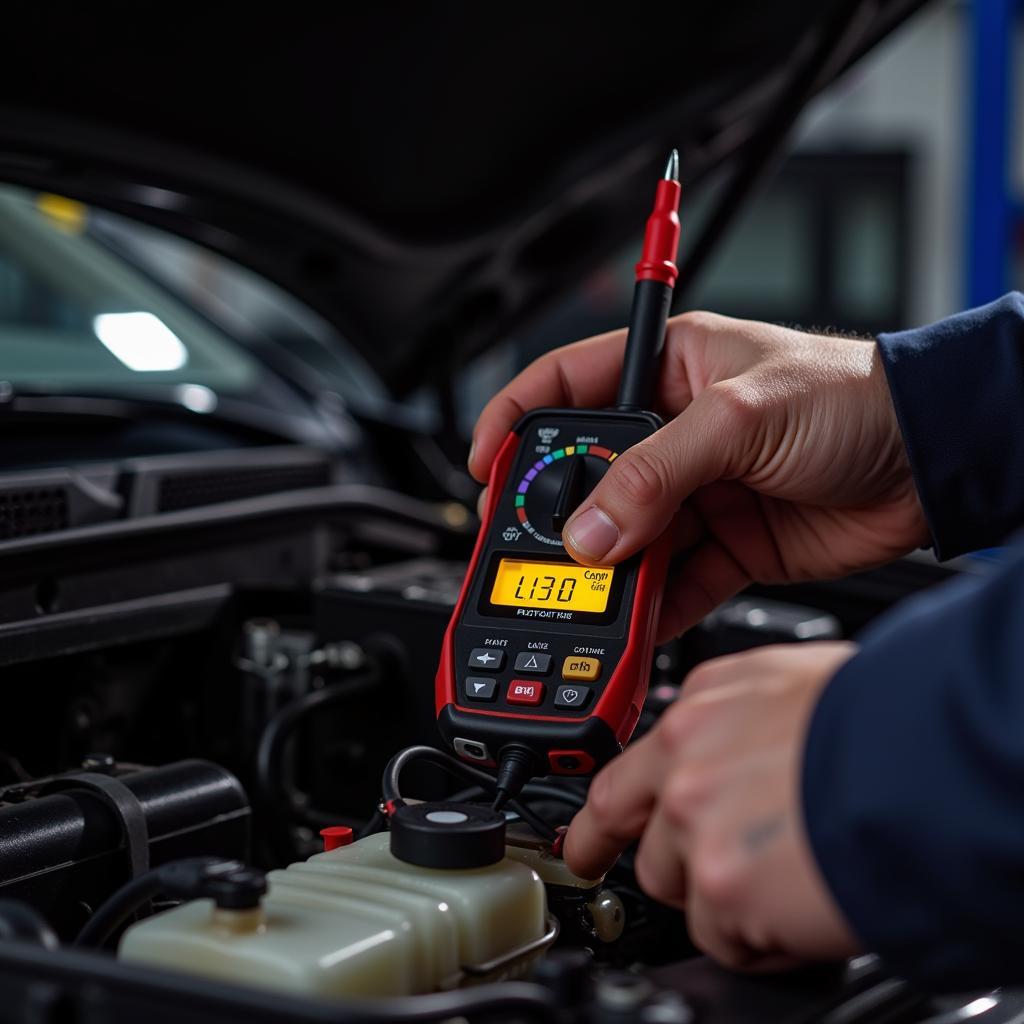Understanding the intricate network of electrical systems in modern vehicles can feel like deciphering ancient hieroglyphics. But with the right Car Electrical Diagnostics Tools, even the most daunting electrical gremlins can be identified and banished. Whether you’re a seasoned mechanic or a DIY enthusiast, this guide will delve into the essential tools to equip yourself for any electrical automotive challenge.
Why Invest in Car Electrical Diagnostics Tools?
Gone are the days of simple wiring diagrams and a test light. Today’s vehicles are complex machines controlled by intricate electronic control units (ECUs). A simple malfunction in a sensor, wiring harness, or actuator can trigger a cascade of confusing symptoms. That’s where car electrical diagnostics tools come in. These tools provide a window into the electronic soul of your car, allowing you to:
- Pinpoint the root cause of electrical problems: Instead of relying on guesswork, you can accurately identify faulty components.
- Save time and money: Accurate diagnosis prevents unnecessary part replacements and costly repeat visits to the mechanic.
- Enhance your understanding of your vehicle: Familiarizing yourself with your car’s electrical system empowers you to address issues proactively.
- Improve your car’s performance and lifespan: Regular electrical checks can help identify potential issues before they escalate into major problems.
Essential Car Electrical Diagnostics Tools for Every Garage
Navigating the world of car electrical diagnostics tools can be overwhelming. Here’s a breakdown of the essential tools to consider, from basic to advanced:
1. Multimeter: The Cornerstone of Electrical Diagnosis
 Multimeter Measuring Car Battery Voltage
Multimeter Measuring Car Battery Voltage
The multimeter is your go-to tool for measuring voltage, current, and resistance. It’s indispensable for testing batteries, circuits, and components.
Key features to consider:
- Digital vs. Analog: Digital multimeters offer easier readability, while analog multimeters provide a more visual representation of fluctuating readings.
- Auto-ranging vs. Manual ranging: Auto-ranging multimeters automatically select the appropriate measurement range, while manual ranging requires you to set it yourself.
- Additional features: Some multimeters offer advanced features like diode testing, continuity checking, and even temperature measurement.
2. Test Light: A Simple Tool for Basic Circuit Testing
A test light is a simple yet effective tool for checking for power and ground in a circuit. It consists of a sharp probe, a light bulb, and a ground wire.
When to use a test light:
- Verifying the presence of power at a fuse or relay
- Checking for ground continuity
- Identifying broken wires
3. Circuit Tester: Taking Circuit Testing a Step Further
 Circuit Tester in Use on Automotive Wiring
Circuit Tester in Use on Automotive Wiring
A circuit tester combines the functionality of a test light with additional features like a built-in digital display, short circuit detection, and reverse polarity protection.
Advantages of a circuit tester:
- More accurate readings than a traditional test light
- Can detect the presence of voltage even in low-voltage systems
- Added safety features protect against electrical shocks
4. OBD-II Scanner: Unlocking Your Car’s Computer
car diagnostic deals dunstable uk
The On-Board Diagnostics (OBD-II) scanner is your gateway to your car’s computer system. It allows you to read and clear diagnostic trouble codes (DTCs), monitor live data from various sensors, and even perform some advanced functions like resetting the check engine light.
Types of OBD-II Scanners:
- Basic code readers: These affordable scanners can read and clear basic DTCs.
- Advanced scan tools: These tools offer more features like live data streaming, graphing capabilities, and even bidirectional control, allowing you to test components.
- Professional-grade scan tools: These high-end scanners offer the most comprehensive functionality, including access to manufacturer-specific codes and advanced diagnostics.
5. Oscilloscope: Visualizing Electrical Signals
For diagnosing complex electrical issues, an oscilloscope is an invaluable tool. It allows you to visualize electrical signals over time, providing insights into the behavior of sensors, actuators, and other electronic components.
When to use an oscilloscope:
- Diagnosing intermittent problems
- Analyzing sensor waveforms
- Testing fuel injectors and ignition systems
Choosing the Right Car Electrical Diagnostics Tools
The best car electrical diagnostics tools for you depend on your budget, skill level, and the types of repairs you plan to tackle.
- DIY enthusiasts: A multimeter, test light, and a basic OBD-II scanner provide a solid foundation for diagnosing common electrical issues.
- Home mechanics: Consider investing in a circuit tester, a more advanced OBD-II scanner with live data streaming, and potentially an oscilloscope if you plan to delve into more complex repairs.
- Professional mechanics: Professional-grade scan tools with manufacturer-specific software, a high-quality oscilloscope, and specialized tools like a lab scope are essential for comprehensive diagnostics and repairs.
Tips for Using Car Electrical Diagnostics Tools Safely and Effectively
- Disconnect the battery: Before working on any electrical system, always disconnect the negative battery terminal to prevent electrical shocks and damage to sensitive electronic components.
- Consult a repair manual: Always refer to a reliable repair manual for your specific vehicle make and model. This will provide wiring diagrams, component locations, and other crucial information.
- Start with the basics: Begin by checking the most obvious culprits like fuses, relays, and battery connections before moving on to more complex diagnostics.
- Take your time: Electrical diagnosis requires patience and attention to detail. Don’t rush the process, and double-check your work to avoid misdiagnosis.
Conclusion
Mastering car electrical diagnostics tools empowers you to take control of your vehicle’s health and keep it running smoothly for years to come. By investing in the right tools and learning how to use them effectively, you can confidently tackle any electrical gremlin that comes your way.
car diagnostics near me mobile
FAQs
1. Can I use a multimeter to test my car battery?
Yes, a multimeter is an excellent tool for testing your car battery. You can use it to measure the battery’s voltage, both at rest and under load, to assess its health and charge level.
2. What is the difference between a circuit tester and a test light?
While both tools can check for power and ground, a circuit tester offers more accurate readings, can detect low-voltage signals, and provides added safety features like short circuit protection.
3. Do I need a professional-grade OBD-II scanner?
For most DIYers and home mechanics, a basic or advanced OBD-II scanner will suffice. Professional-grade scanners are typically reserved for professional mechanics who require access to manufacturer-specific codes and advanced diagnostic capabilities.
4. Can car electrical diagnostics tools help me improve my car’s fuel efficiency?
Indirectly, yes. By identifying and resolving electrical issues that affect engine performance, such as faulty sensors or a malfunctioning oxygen sensor, you can potentially improve your car’s fuel efficiency.
5. What are some common car electrical problems?
Common car electrical problems include dead batteries, blown fuses, faulty alternators, malfunctioning starters, and issues with wiring harnesses.
6. How can I learn more about using car electrical diagnostics tools?
Numerous online resources, forums, and videos provide valuable information and tutorials on using car electrical diagnostics tools. You can also enroll in automotive technology courses at local community colleges or technical schools.
7. Is it worth investing in car electrical diagnostics tools if I only perform basic maintenance?
Even for basic maintenance, having a multimeter and a basic OBD-II scanner can be beneficial. These tools allow you to check battery health, diagnose check engine lights, and perform simple electrical tests, saving you time and potential headaches in the long run.
Need Help? Contact Us!
Have more questions or need assistance with car electrical diagnostics? Our team of experts is here to help! Contact us via WhatsApp at +1(641)206-8880 or email us at [email protected]. We offer 24/7 customer support to answer all your queries.

Leave a Reply